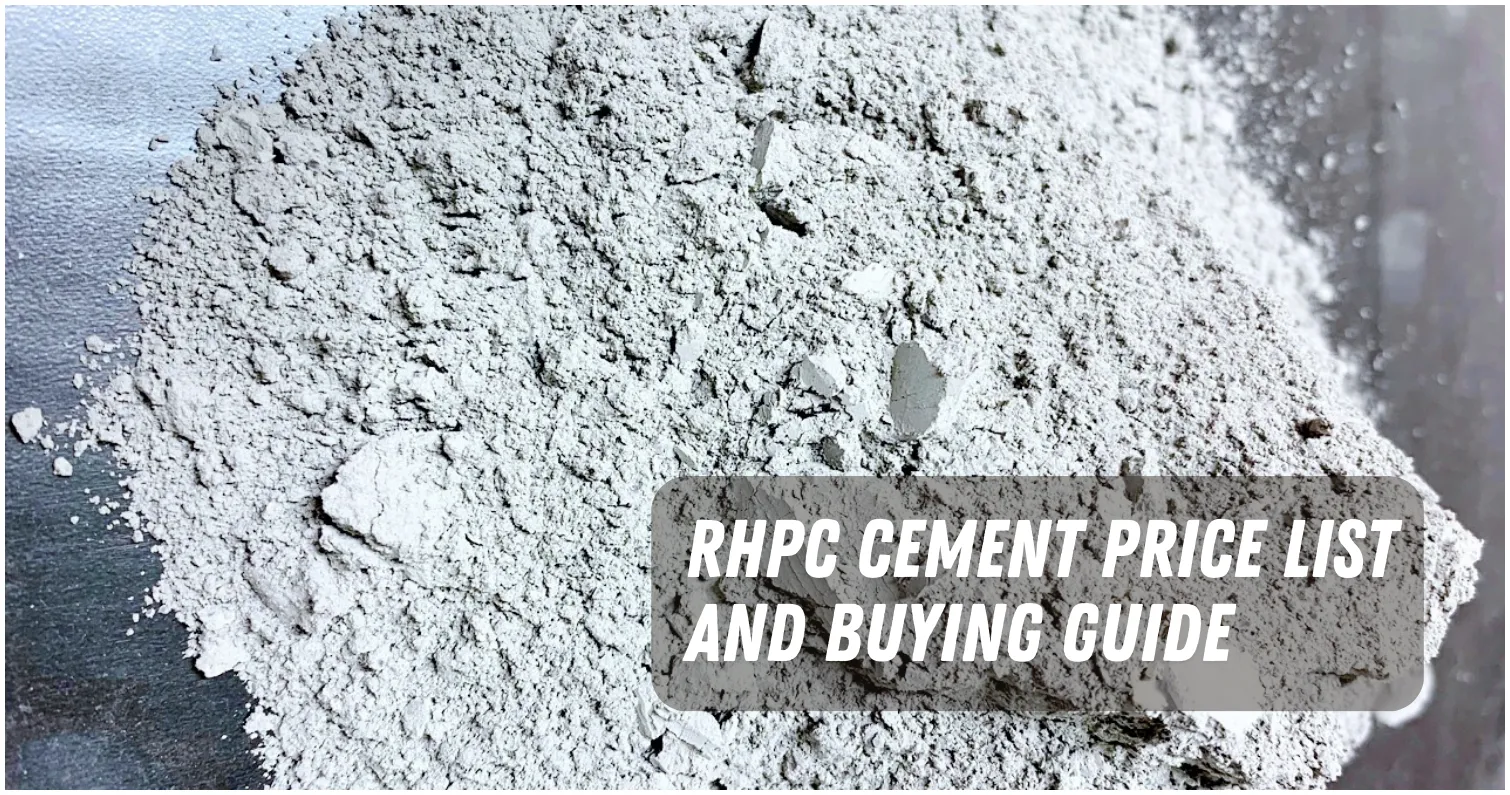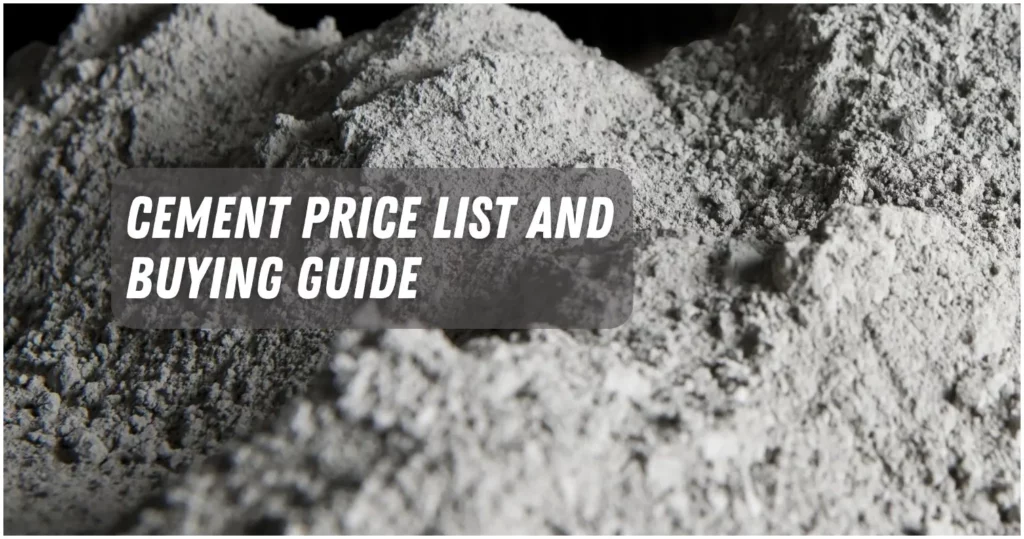RHPC cement price in Philippines is one of the things that builders and homeowners look up the most.
Rapid Hardening Portland Cement (RHPC) is a type of cement that gets stronger faster than regular Portland cement (OPC).
It is also known as extra rapid hardening cement and quick hardening cement.
In this article, we’ll talk about everything about RHPC, like their price list, which is usually between ₱250 and ₱320.
What is RHPC

Ordinary Portland cement (OPC) has a higher percentage of tricalcium silicate (C3S) and a lower percentage of dicalcium silicate (C2S) than Rapid Hardening Portland Cement (RHPC).
C3S is the main compound that makes concrete strong early on, while C2S makes it strong over time.
RHPC also has smaller particles and less gypsum than OPC, which makes it hydrate faster and release more heat during the setting process.
Rapid Hardening Portland Cement Properties

The following are traits of Rapid Hardening Portland Cement (RHPC):
- It has a longer initial setting time and a shorter final setting time than OPC. This means that it hardens faster and reaches its design strength earlier.
- It has a higher compressive strength than OPC at all ages, but especially at 3 days and 7 days. It can reach 25 MPa in 3 days and 40 MPa in 7 days, while OPC can reach 16 MPa and 27 MPa respectively.
- It has a higher heat of hydration than OPC, which means it makes more heat during the curing process. This can cause thermal cracking if it is not controlled properly.
- It is harder to work with than OPC, so more water and additives are needed to get the right slump or flowability.
- It doesn’t last as long as OPC, so it is more likely to be damaged by chemicals, corrosion, and wear.
Rapid Hardening Portland Cement Uses

Most of the time, Rapid Hardening Portland Cement (RHPC) is used for the following:
- Precast concrete products: RHPC can be used to make pipes, blocks, tiles, poles, and other precast concrete items that need to be quickly broken apart and moved.
- Repair and rehabilitation work: RHPC can be used to fix or strengthen structures like bridges, roads, buildings, etc. that are broken or falling apart and need to be put back into use as soon as possible.
- Concreting in cold weather: RHPC can be used to make concrete in cold weather when OPC might freeze or set slowly. RHPC can cut down on the time it takes to cure and the money it costs to heat.
- Concrete pavements: RHPC can be used to make concrete pavements that need to be ready for traffic quickly or that need to be able to hold a lot of weight.
RHPC vs ERHC

Both RHPC and ERHC are types of cement that harden quickly, but they are different in some ways.
Extra Rapid Hardening Cement, or ERHC, is a type of cement that contains calcium chloride (CaCl2), which speeds up the hardening process.
CaCl2 can speed up the process of C3S and C2S getting wet, which makes them set and harden more quickly. But CaCl2 also has some bad things about it, such as:
- It can cause the steel reinforcing in concrete to rust.
- It can make concrete harder to work with and less durable.
- It can cause concrete to shrink and crack more.
So, ERHC is not a good choice for long-term applications or structures made of reinforced concrete.
CaCl2 and other accelerators are not in RHPC, so these problems do not happen.
But RHPC also starts out with less strength than ERHC. For example, ERHC can achieve 40 MPa in 1 day, while RHPC can achieve 25 MPa in 3 days.
Rapid Hardening Portland Cement Price List

The price of RHPC in the Philippines varies depending on the brand, quality, quantity, and location.
To give you an idea of how much RHPC costs in different regions of the Philippines, here are some of sample price:
| Region | Price per 40kg |
|---|---|
| Metro Manila | ₱250-₱280 |
| Central Luzon | ₱260-₱290 |
| Southern Luzon | ₱270-₱300 |
| Visayas | ₱280-₱310 |
| Mindanao | ₱290-₱320 |
Rapid Hardening Portland Cement Pros and Cons
Rapid Hardening When compared to regular Portland cement, Portland Cement has some pros and cons. Here are a few examples:
Pros:
- It can save time and money by shortening the time it takes to cure and speeding up the building schedule.
- It can improve the productivity and efficiency of making precast concrete by making it easier to get the concrete out of the mold and move it.
- By giving high early strength and bonding, it can improve the performance and quality of repair and rehabilitation work.
- It can help with the problems of pouring concrete in cold weather by stopping damage from freezing and frost.
Cons:
- It can make thermal cracking more likely by making more heat when it gets wet.
- It can make concrete harder to work with and less durable because it needs more water and admixtures.
- It can make it harder to design and use concrete because it sets faster and works less well with some additives and aggregates.
Things You Should Know about RHPC
Here are some frequently asked questions and answers about rapid hardening Portland cement:
- What is the difference between OPC and rapid hardening Portland cement?
OPC is slower to set but has higher long-term strength, while rapid hardening cement sets quickly and has early strength. OPC is versatile, while rapid hardening cement is for specific fast-setting needs. - What is the difference between RHC and QHC?
Both have higher early strength than OPC, but rapid hardening has higher C3S and finer particles. Quick hardening contains additives like fly ash for lower heat and more durability. - How long does rapid setting cement take to set?
Rapid setting cement varies by brand and conditions. Generally, it achieves initial set in 30 minutes and final set in under 2 hours. - Why rapid hardening cement is not used for mass concrete construction?
Rapid hardening cement’s high heat of hydration causes thermal cracking in mass concrete. Low heat cements like low heat Portland cement are better for mass projects. - Which admixture is used for rapid hardening concrete?
Admixtures for rapid hardening include accelerators (like calcium chloride), retarders (like sugar), water reducers (like lignosulfonates), and air entrainers (like fatty acids) for improved performance.
If you want to know how much RHPC cement price in the Philippines, you should look for information online and compare prices from different suppliers.
You should also talk with the supplier and think about the costs and availability of delivery.
We hope you now know what RHPC is and how much it costs in the Philippines because of this blog post.
If you have any questions or thoughts, you can leave them below.
[ratings]

